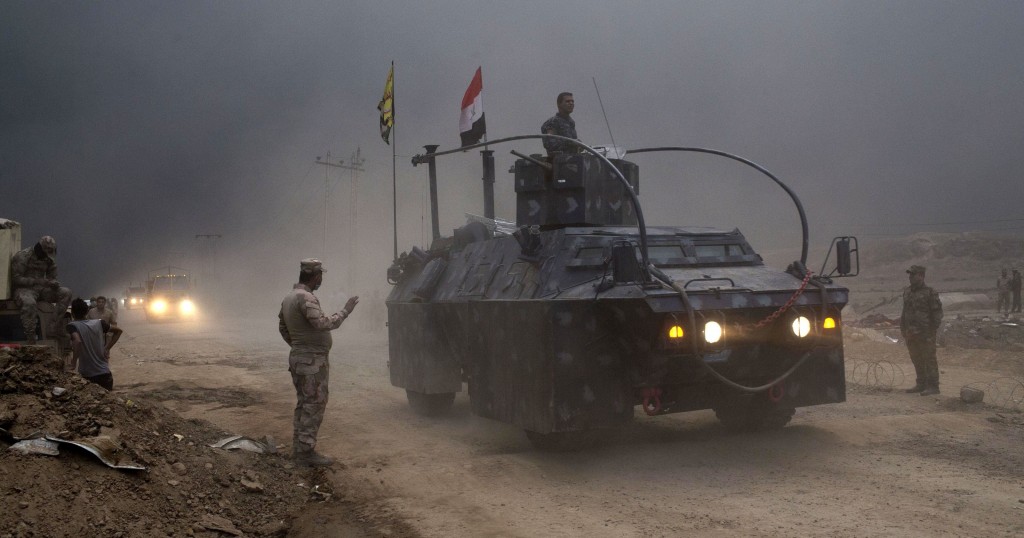 Anti-ISIS troops are 5km away from Mosul, second Iraqi city with 2 million inhabitants. There are about 7,000 jihadists in the city, besieged by an army of 30,000 soldiers of different cultures, religions and nationalities. The Kurdish Peshmerga, Sunni and Shia Iraqi soldiers, USA’s crack troops, Turkish air force and Italian soldiers are working together in order to help injured people of the coalition and to defend Mosul’s dam.
Anti-ISIS troops are 5km away from Mosul, second Iraqi city with 2 million inhabitants. There are about 7,000 jihadists in the city, besieged by an army of 30,000 soldiers of different cultures, religions and nationalities. The Kurdish Peshmerga, Sunni and Shia Iraqi soldiers, USA’s crack troops, Turkish air force and Italian soldiers are working together in order to help injured people of the coalition and to defend Mosul’s dam.
Until now, Kurdish and Iraqi soldiers have taken control of 30 villages in the Mosul area. Violent conflicts are taking place in the strategic village of Tal Kayf, where the Kurdish Peshmerga penetrated into jihadists’ lines. Meanwhile, Iraqi army reached the core of Hamdaniyah, the biggest area with a Christian majority.
To fight together does not mean to be united. Both Iraq and Turkey are sceptical about a joined military action, and this could complicate and slow down the operation. Iraq strongly reaffirms its “no” to the Turkish participation in the Mosul attack. “The fight for Mosul is an Iraqi fight, led by Iraqi”, said the Iraq Prime Minister. Moreover, it will be necessary to avoid conflicts between Sunni population and the Shia soldiers participating in the attack once inside the city.
Russian president Vladimir Putin, referring to the sanctions against Russia because of the Aleppo actions, declared: “We won’t behave hysterically as west countries did, because we are aware that we need to fight terrorism and that there’s no other way but military action.” On the USA side, the presidential election of November already is the protagonist of the country’s foreign policy, and its results will be crucial to understand the development of such policy.
The UN confirms that civilians could suffer the worst consequences: they could be used as human shields and one million people are at risk of losing their houses. The CNN writes that between Thursday and Friday Isis had killed about 300 people in mass executions, according to an intelligence source.
There are several obstacles before conquering Mosul. Isis soldiers won’t face openly the coalition army, but will use urban guerrilla tactics, making soldiers and civilians impossible to distinguish. After having conquered Mosul, it will be necessary to fix each element that simplified the ISIS taking of the city. Moreover, Iraq doesn’t have resources to rebuild the city. Iraqi administration goes on dealing with the consequences of corruption and of internal fights between Shia and Sunni officials, that fragment the administration itself in smaller groups, difficult to control.
Isis is resisting to the defeat because the critical points haven’t been solved yet and because USA, Russian and Turkish armies don’t have the same aims. These countries’ governments are in alliances with very different groups, both political and military groups, and in some cases they have totally different aims. For example, USA is supporting the Kurdish issue, while Turkey doesn’t; Russia is supporting Assad, while USA doesn’t. This delays the solution and impedes the ISIS defeat.
Italian foreign minister Gentiloni assures that “In these circumstances, Mosul and Raqqa, Syria, should be free in a couple of months”. But huge investments during decades and a radical cultural and religious changing in the whole international community, both Arab, Western and Asian, will be necessary in order to make Iraq and Syria stable and pacific again. There’s the need for a change in international relationship, especially in foreign, economic and religious policy. Without this, there’s the risk of a permanent conflict.
(traduzione Greta Schiavo)






